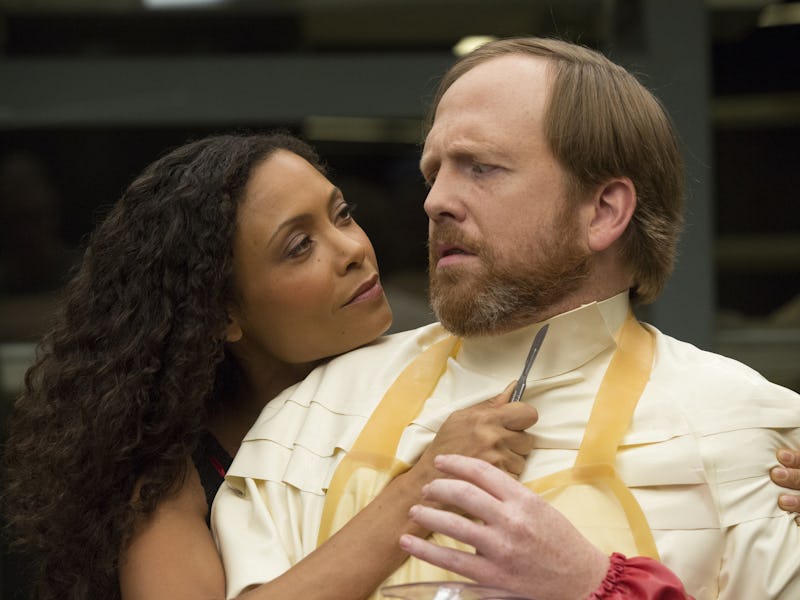Maeve's 'Westworld' Story Raises Questions About the Maze
Why Maeve's awakening might hold answers about Westworld's mysterious maze storyline.

Westworld is a complicated puzzle, and it’s still incredibly difficult to see how some pieces fit together. For a time, it seemed the mysterious maze would be important to the Man in Black and Dolores, while Maeve and Hector existed in a mostly separate sub-plot. But Maeve’s story in “The Adversary” suggests that Westworld is actually more cohesive than most fans thought, and Maeve’s story might give a hint about the maze’s future.
At the beginning of “The Adversary,” we watch Maeve kill herself by way of a rough lover. Before sex, she provokes him by insulting his sexual prowess and invites him to choke her. As she dies by his hand, her face is expressionless, but when she wakes up on the “operating table” in the tune-up lab, she looks utterly triumphant.
Shocked, the technician Felix says, “I don’t understand how you’re waking yourself up!” She then charms him into divulging her true nature, and has him give her a tour of the facility.
Maeve and Felix
In “Dissonance Theory,” Ford refers to himself as “the god of this place.” That same episode, when Maeve presses Hector for answers about the men in strange suits who plague her dreams, he tells her, “It’s a blessing from God to see the masters who pull your strings.”
If a god is someone who “pulls the strings,” then in “The Adversary,” Maeve becomes her own god. While she’s hardly the only host searching for meaning — Dolores has talked about wanting to find herself and Teddy is searching to overcome his past with the villainous Wyatt — Maeve is the first host to discover her true nature. She’s also the first to manipulate the system, once she figures out how it works. When Felix and his fellow programmer show her the screen that controls her behavior, she says, “I’d like to make some changes.” At her request, they crank up her intelligence to the highest level possible.
In this way, not only is Maeve more proactive than the other hosts, but she is able to achieve a higher level of consciousness than anyone else has in the first six episodes. She takes control of her narrative in an unprecedented way.
If Westworld follows the 1973 movie it’s based on, we can expect future episodes to bring violent reckoning between park hosts and guests. The film’s plot is rather simple: The robots malfunction and kill the humans. We’ve already seen the show approach this idea in the form of the first episode’s weird milk-loving murderer and Dolores’s first Shakespeare-spouting father. But Maeve’s story in “The Adversary” suggests that those cases might be the minority.
When a true fight between hosts and humans arrives, instead of merely malfunctioning because of the reveries, the hosts might actively choose to kill the humans. Maeve has opened the door for this possibility.
Mave and Sylvester in "The Adversary"
Further, her story could offer a suggestion about the nature of the mysterious maze. Thus far, although much about the maze remains unknown, the show has consistently brought it up in a way that connects to park founder Arnold.
In the fourth episode, the Man in Black — who we know is searching for the maze — says:
You ever heard of a man named Arnold? He created a world where you could do anything you want, except one thing. You can’t die. Which means no matter how real this world seems, it’s still just a game. But then Arnold went and broke his own rule. He died right here in the park. Except I believe he had one story left to tell. A story with real stakes, real violence. You could say I’m here to honor his legacy.
If the Man in Black is searching for the maze and he wants to honor Arnold’s legacy, this suggests these two ideas could be connected. And as Ford explained in “The Stray,” Arnold’s goal was for the hosts to achieve a higher level of awareness. Several times, we have seen various characters talk about the maze in conjunction with the word “freedom.”
In the third episode, Bernard tells Dolores, “There’s something I’d like you to try. It’s a game, a secret. It’s called the maze. … The goal is to find the center of it. If you can do that, then maybe you can be free.” On his quest for the maze, the Man in Black also tells Lawrence, “What if I told you I’m here to set you free?”
In “The Adversary,” Teddy tells the Man in Black his own view of the maze. “At the center there’s a legendary man who’d been killed over and over again countless times. He always clawed his way back to life,” he says. This evokes the way we’ve seen Teddy die and come back to life countless times, and it especially speaks to Maeve willfully dying, only to come back to life in order to find answers.
But now that Maeve has found them in a way that does not relate to the maze, it calls into question this idea of the maze as a place to find “freedom.” What does this freedom mean, if it doesn’t speak to a higher sense of awareness and control? Maeve’s journey is fascinating on its own, but it also further deepens the mystery of the larger story.